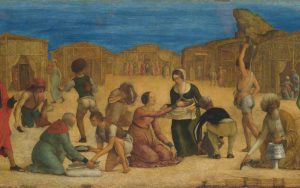Thoughts on Sunday’s Lessons for Aug. 1, 2021
First Reading (Track One): 2 Samuel 11:26-12:13a
Last Sunday we heard a shocking story about King David, who raped the beautiful Bathsheba, then arranged to have her husband, Uriah, killed in battle so David could have Bathsheba for himself.

Israelites Gathering Manna (c.1490), tempera painting on canvas by Ercole de’ Roberti (c.1451-1496). National Gallery, London. (Click image to enlarge.)
This week we get the rest of the story: The prophet Nathan, following instructions from God, tells David about a selfish rich man who took away and slaughtered a poor man’s beloved lamb. Angry beyond measure, David curses the rich man and threatens to have him killed. Then comes Nathan’s charge: “You are the man!” A merciful God threatens David with serious punishment but spares his life. In the verses following these, though, Nathan foretells that the child of David’s illicit union must die.
First Reading (Track Two): Exodus 16:2-4, 9-15
From God’s gift of manna to God’s gift of grace through Jesus, our Track Two readings over the next few weeks focus on bread – the bread of life – as metaphor for God’s abundant love. In last Sunday’s First Reading, when the Prophet Elisha fed 100 people with a few small barley loaves, he recalled God promising the people that “They shall eat and have some left.” In this Sunday’s reading we go back to the verses of which Elisha spoke, when God provided abundant manna, a gift of bread in the desert.
Psalm (Track One): Psalm 51:1-13
We heard this familiar Psalm passage a few months ago on the fifth Sunday of Lent, but it certainly bears repeating in the context of King David’s adultery and murder. The Psalm’s powerful narrative envisions David wracked in repentant guilt as he confronts his great sin. In poetic words that mirror the promises of God’s covenants with the people, David pours out his shame and grief. He makes no excuses for his wicked acts, but begs for God’s mercy and forgiveness. “Create in me a clean heart, O God,” the Psalmist begs in the assumed voice of David: create in us a clean slate upon which God can write a new covenant of love.
Psalm (Track Two): Psalm 78:23-29
The Psalmist remembers God’s gift of manna and gives thanks to the Creator who saw the people’s need and rained down on them all the bread and meat that they could eat. God filled them up; God gave them what they craved. The preceding verses of this psalm, which we don’t read this Sunday, add context: The Psalmist recalls how God led the people out of slavery in Egypt. God cared for them, and ultimately overcame divine anger and fed them with love in spite of their ungrateful complaints.
Second Reading: Ephesians 4:1-16
The author of Ephesians, writing in Paul’s name a generation or two later, seems to draw inspiration from Paul’s memorable metaphor in his in First Letter to the Corinthians. Like Paul, Ephesians envisions the Christian community as Christ’s body, in which each of us acts according to our gifts. We are all called to work together with humility and gentleness to make the body function, living in unity as one body and one spirit, “one Lord, one faith, one baptism, one God and Father of all.”
Gospel: John 6:24-35
Huge crowds continue following Jesus around the shores of Galilee. Having watched his miraculous healings and shared in the bountiful loaves and fishes, they are fascinated by this remarkable rabbi. They want to know more about him, but Jesus quite bluntly tells them that they just want more bread. Don’t fret about the world’s bread that does not last, Jesus tells them. Continuing his extended discussion about the bread of life that we will hear in John’s Gospel through most of August, Jesus declares in these beloved words: “I am the bread of life. Whoever comes to me will never be hungry, and whoever believes in me will never be thirsty.”
